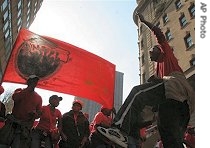2007年VOA标准英语-Education, Health Hardest Hit in South African(在线收听)
Johannesburg
01 June 2007
Across South Africa schools were closed and many hospitals turned away all but emergency cases as public servants observed the first day of a strike. VOA's Delia Robertson reports from our bureau in Johannesburg, unions say they will strike until their demands for higher pay are met.
 |
| Strikers take part in a civil servants' protest march in downtown Johannesburg , 01 June 2007 |
"The response of the public sector workers has been absolutely magnificent all over the country," he said. "As reports come in its clear that the vast majority of workers called on to strike did indeed do so."
For its part the government says that support has been patchy. Speaking on national radio, Public Services Minister Geraldine Fraser-Moleketi said many public servants reported for duty.
"When we look at the functioning of government today, it has functioned largely as normal," she said. "We have regrettably seen large stayaways in the education sector and there have been pockets of disruption in the health sector."
Even though health professionals are classed as essential workers who may not strike, patients in many hospital wards across South Africa received only cursory care Friday. While most nurses reported for duty, they joined pickets outside the hospitals leaving only skeleton staff to care for patients.
In some hospitals, casualty departments treated only the gravest cases and pharmacies did not dispense medicine. In Cape Town police used stun grenades to disperse workers who had blocked the entrance to the city's largest hospital.
In some prisons, warders embarked on work-to-rule action. Police officials say all officers reported for duty.
Most public schools across the country were closed; although in some cases, teachers continued teaching learners in their final year of high school. Activities in many courts were also disrupted as staff downed tools.
The strike follows a deadlock in pay negotiations, with the unions demanding a 12 percent increase, and the government offering a package that includes a six percent wage hike.
Although both sides seem to be distant from each other, Finance Minister Trevor Manuel last month suggested the government may be willing to increase its offer, but not above nine percent.
Some independent labor analysts say that there is merit in the union's rejection of the government offer. They argue that it would be fair for government to offer between 6.5 and 8 percent. They add that unions might settle for a package that included such an offer.
This week technical teams drafted a fresh negotiating document, currently under consideration by both sides and which may form the basis of a new round of talks expected early as next week.